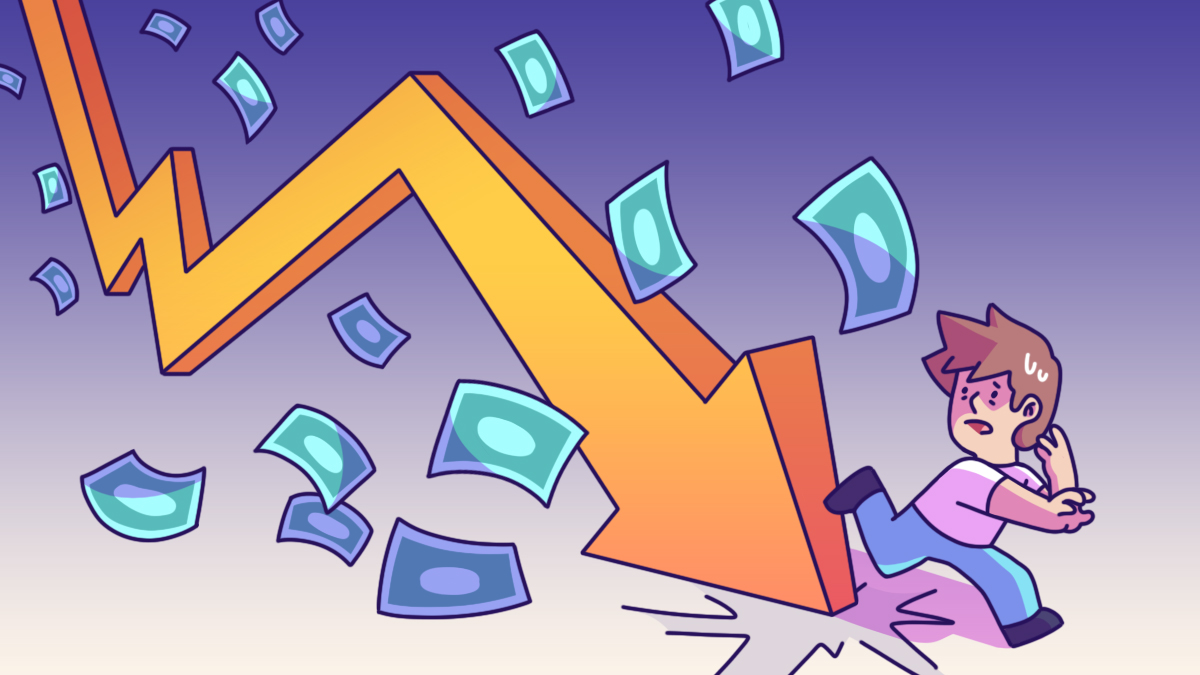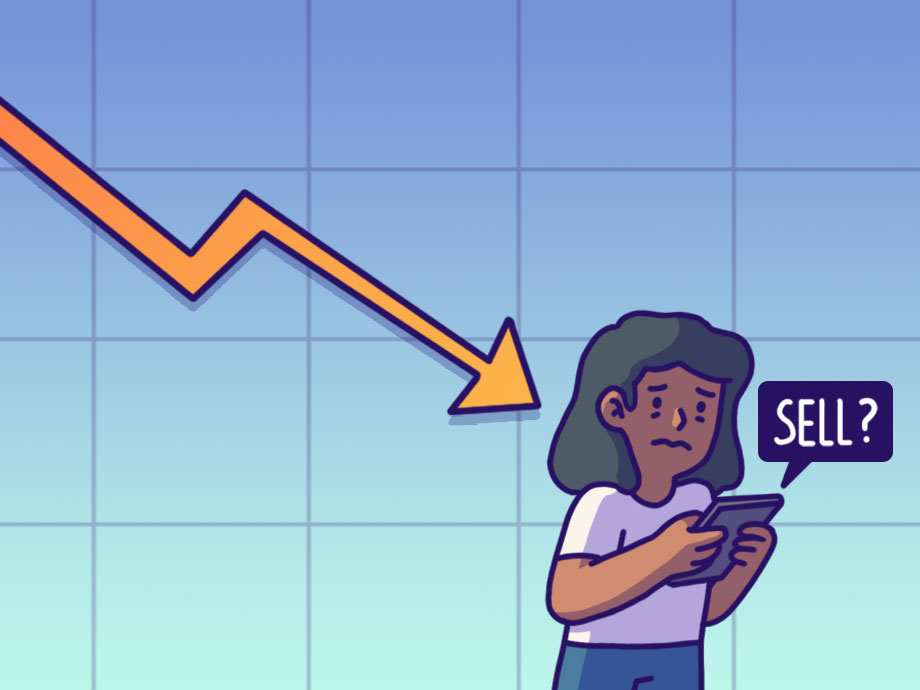Investing | Personal Finance | Article
My Investments Keep Going Up And Down. What Should I Do?
by Cherry Wong | 24 Apr 2024

Investing in financial markets can be an exhilarating journey, but it comes with its fair share of highs and lows.
Extreme market movements can evoke a whirlwind of emotions, leaving investors in a state of confusion and nervous anticipation. In such turbulent times, it’s not uncommon to feel lost, unsure of how to navigate the storm, and contemplating the right actions to safeguard one’s investments.
To safely navigate through market storms, you first have to understand why markets are volatile.
Assets Are Always Priced According To Fundamentals
In financial markets, the pricing of assets is not a random act but rather based on the principles of fundamental analysis. Assets are priced based on their financial health and performance.
For example, in figuring out if a stock is a good investment at a certain price, to ascertain the company’s intrinsic value, we will assess the price based on the company’s Earnings Per Share (EPS), revenue growth, profit margins, and the overall growth trajectory.
But then, why do stock prices fluctuate on a day-to-day basis when the underlying fundamentals don’t often change?
One of the intriguing puzzles within financial markets is the seeming disconnection between the stability of fundamental factors and the daily price fluctuations. While the fundamentals of an asset may remain relatively unchanged over short periods, their price volatility and unpredictability are caused by various market dynamics at play.
Market “Emotions”
Financial markets, particularly stock markets and bond prices, show that daily fluctuations can leave investors on an emotional roller coaster.
Understanding the underlying factors can help relieve investors fears and to prevent them from making investing mistakes. Generally, investors react to market movements in the following ways:
- Stock market up – “I’m optimistic, I think companies will do well. They will likely grow, make more money and be worth more in the future”
- Stock market flat – “I don’t know what to do”
- Stock market down – “I’m pessimistic, I think companies won’t do well. They will not likely do well, make less money or become worthless”
Are these familiar to you as an investor?
Market volatility stems from various factors, often aggregated and intertwined. The two primary influences on market movements are changes in fundamental factors such as companies’ earning potential and macroeconomics. Another cause is changing market sentiment, the shift in the collective opinions and emotions that drive buying and selling decisions.
Market sentiment, the collective mood and attitude of investors toward a particular security, asset class, or the market as a whole, plays a pivotal role in influencing market volatility.
Related
Common Market Sentiment Drivers
Several market factors contribute to these emotional swings, including:
Economic Factors and Situations: The Sentiment Barometers
Economic indicators serve as the pulse of market sentiment. Inflation rates, interest rates, and currency fluctuations act as powerful barometers, influencing the collective mood of investors.
- High inflation may trigger concerns about eroding purchasing power, while changes in interest rates can alter the attractiveness of various investment avenues.
- Currency fluctuations, in turn, affect the competitiveness of businesses on a global scale.
- These economic factors collectively contribute to the emotional swings in the market, guiding investors towards optimism or caution based on the prevailing economic conditions.
Geopolitical Issues: The Cloud of Uncertainty
Geopolitical events cast a looming shadow over financial markets, injecting an element of uncertainty that can trigger market reactions. Trade sanctions, military conflicts, and other geopolitical developments have the potential to disrupt global economic stability.
- Investors, sensitive to the ripple effects of such events, often respond with swift and sometimes emotional decisions.
- The uncertainty stemming from geopolitical issues creates a volatile environment where market sentiment can shift dramatically, changing asset prices and investment strategies.
News and Opinion Pieces: Shaping Perceptions
In an era of information overload, news and opinion pieces act as catalysts, shaping public beliefs and influencing investor behaviour. Media narratives about economic events and the unknowns associated with them contribute significantly to market volatility.
- Positive or negative interpretations of economic data, coupled with speculative opinions, can trigger rapid buying or selling decisions.
- The sway of news in the digital age amplifies the emotional response of investors, adding fuel to the fire of market volatility.
Related
Navigating Market Volatility
For the average investor, staying abreast of all these factors can be overwhelming. In times of heightened volatility, the temptation to follow the crowd and succumb to market sentiment becomes particularly dangerous. This herd mentality can lead to impulsive decisions that may not align with one’s long-term investment goals.
In the face of market turbulence, it’s essential to adopt strategies that can help investors weather the storm:
Tip 1) Avoid Impulsive Reactions: One bad event or news doesn’t call for an immediate reaction. It’s often prudent to wait for the dust to settle before making decisions.
In the face of sudden market swings, the knee-jerk reaction may be to make impulsive decisions. However, seasoned investors understand the value of patience. One bad event or a piece of negative news doesn’t necessarily require an immediate response. It’s often prudent to resist the urge to react impulsively and wait for the dust to settle.
Markets tend to overreact in the short term, and hasty decisions can lead to regret. By taking a step back and assessing the situation calmly, investors can avoid making emotionally charged decisions that may not align with their long-term goals.
Tip 2) Review Investments: When market turbulence hits, it’s time to review the fundamentals of your investments. Assessing the underlying strength of your portfolio helps in distinguishing between short-term market noise and potential long-term impacts.
If the fundamentals of your investments stay robust and in line with your overall strategy, it might be wise to hold onto them. Markets have historically shown resilience over time, and allowing investments in the space to grow can be a prudent strategy. However, if a thorough review suggests otherwise, a reassessment of the portfolio may be necessary.
Tip 3) Diversification: Diversification is a tried-and-true strategy to minimise risk in the face of market fluctuations. By spreading investments across different asset classes—such as stocks, bonds, and real estate—investors can create a diversified portfolio.
Diversification acts as a buffer against the impact of a single market movement on the entire portfolio. While one asset class may experience volatility, others may remain stable or even perform well. This strategic allocation helps to smooth out the peaks and troughs, providing a more stable and resilient investment foundation.
Tip 4) Consider Funds and ETFs: For those new to investing or uncertain about assessing individual stocks, considering professionally managed mutual funds or Exchange-Traded Funds (ETFs) can be a prudent choice. These investment vehicles offer instant diversification, as they pool funds from multiple investors to invest in a broad range of assets.
Mutual funds and ETFs are managed by seasoned investment professionals who navigate the complexities of the market. This allows investors to get help from professional fund managers, spreading the risk across a diversified portfolio without the need for in-depth market analysis.
Market Sentiment Drivers Will Not Change Your Investment Fundamentals
The most important takeaway is that if the market sentiment drivers are not going to change the fundamentals of your investments and you have invested based on the value of the asset, no market volatility should shake your confidence!
To successfully navigate the ups and downs of markets requires a “cool head”, a disciplined approach, a long-term perspective, and a commitment to staying informed. By understanding market dynamics and implementing sound investment strategies, investors can ride out the turbulence and position themselves for financial success over time.




















